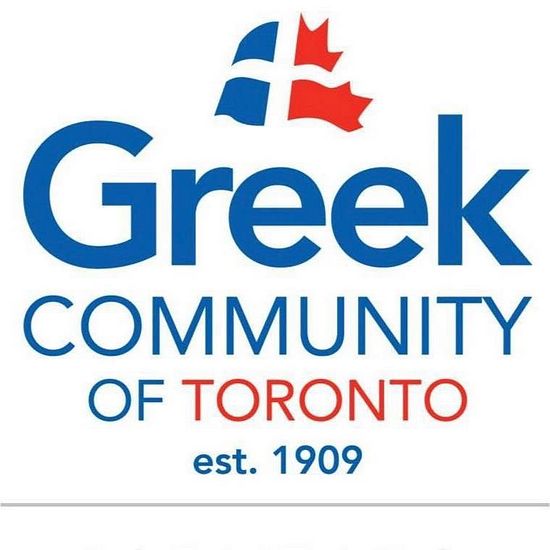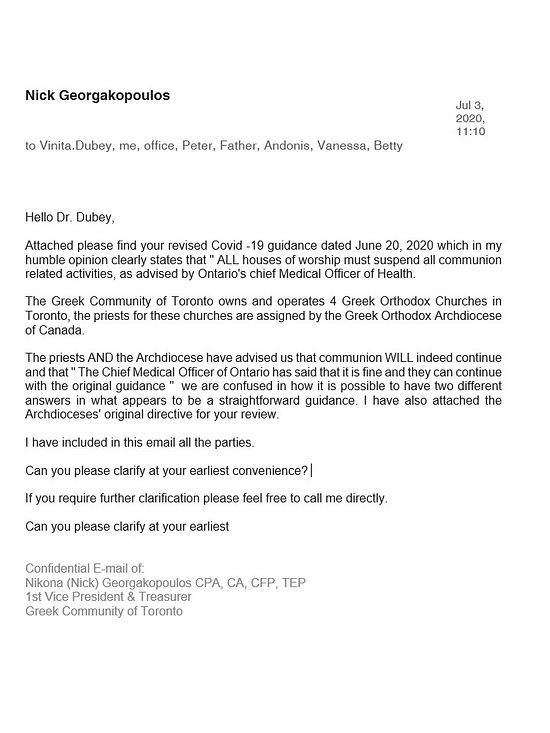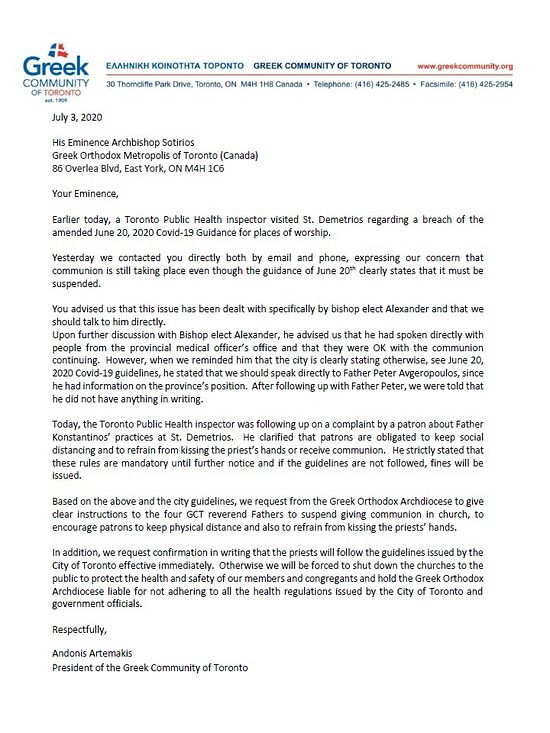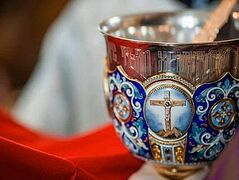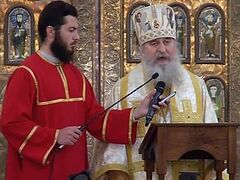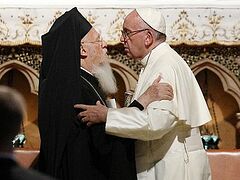Toronto, July 8, 2020
Yesterday, OrthoChristian reported that, the city of Toronto banned Holy Communion in its “COVID-19 Guidance for Places of Worship” issued on June 20, based on the recommendation of the Ontario Ministry of Health.
This ban was communicated to priests of the Greek Metropolis of Toronto in the evening of Saturday, July 4, as Fr. Fanourios Pappas of St. Nicholas Greek Orthodox Church in Toronto emotionally told his flock that Sunday.
However, letters published by the Greek Community of Toronto (GCT), a charitable organization that owns and operates four churches in Toronto, testify that the ban was instigated by the organization and parishioners of the churches themselves, while the city seemed to be laxer on enforcing the requirements.
In an email to Dr. Vinita Dubey dated July 3, Toronto’s Associate Medical Officer of Health, Nick Georgakopoulos, 1st Vice President and Treasurer of the GCT, reports that while the city’s guidance “clearly states that ‘ALL houses of worship must suspend all communion related activities, as advised by Ontario’s chief Medical Officer of Health,’” both the priests of the GCT’s four churches and the Archdiocese “have advised us that communion WILL indeed continue,” with the consent of the Chief Medical Officer of Ontario.
The GCT is confused by the contradictory approaches to “what appears to be a straightforward guidance,” Georgakopoulos writes, asking Dr. Dubey to clarify the situation.
Read the full email below:
And in a letter to Metropolitan Sotirios of the Greek Orthodox Metropolis of Toronto of the Patriarchate of Constantinople dated July 3, Andonis Artemakis, President of the GCT, reports that a public health inspector visited St. Demetrios’ Church, one of the four owned by the GCT, “regarding a breach of the amended June 20, 2020 Covid-19 Guidance for places of worship.”
Artemakis also notes that the GCT was concerned that Holy Communion continued to be offered in the churches of the Metropolis despite the city’s requirements.
The GCT contacted Bishop-elect Alexander, who told them that he had spoken with representatives of the provincial medical officer’s office “and that they were OK with the communion continuing.” Thus, the GCT reminded the Bishop-elect “that the city is clearly stating otherwise.”
Artemakis then notes that the public health inspector visited the St. Demetrios Church “following up on a complaint by a patron about Father Konstantinos’ practices.” The inspector “clarified that patrons are obligated to keep social distancing and to refrain from kissing the priest’s hand or receive communion” and “strictly stated that these rules are mandatory until further notice and if the guidelines are not followed, fines will be issued.”
The GCT thus requests that Met. Sotirios give clear guidance to the priests of the four churches owned by the GCT to suspend giving Holy Communion.
The GCT also requests written confirmation that the priests will comply, otherwise the four churches will be shut down, Artemakis warns, and the Archdiocese will be held “liable for not adhering to all the health regulations issued by the City of Toronto and government officials.”
Read the full letter below:
The next day, the Metropolis sent instructions for priests to suspend offering Holy Communion to the faithful. The order went beyond the four churches owned by the GCT, as a video originally published on the Metropolis’ YouTube page showed Fr. Fanourios Pappas announcing the ban at St. Nicholas Greek Orthodox Church in Toronto, which is not one of the churches operated by the GCT.
An SMS conversation posted by the GCT also indicates that the Metropolis’ ban extends to all of Ontario, not just the city of Toronto.
While the GCT writes of itself that “the GCT and its members… are committed to providing an environment for Greek culture and heritage to flourish, thus enriching the unique social and cultural fabric within a vibrant and diverse Canada,” and that “The church is an important social formation that has contributed significantly to the successful adjustment of Greek immigrants into Canadian society,” the organization seems to have a turbulent history with the Metropolis.
In an article linked on the front page of the Metropolis’ website, the Metropolis responds to a statement of claim filed by the GCT in 2017, calling it “baseless and wholly without merit,” noting that this was not the first time the organization has made claims against the Church.
“The latest attempt by the GCT against our Metropolis is recognized by all for what it is: yet another desperate attempt to divert attention from the issues it faces and discredit our Metropolis,” the statement reads.
OrthoChristian was unable to confirm by time of publication of this article whether any other Orthodox jurisdictions represented in Toronto are adhering to the city’s published requirements.

